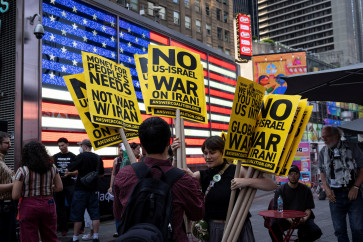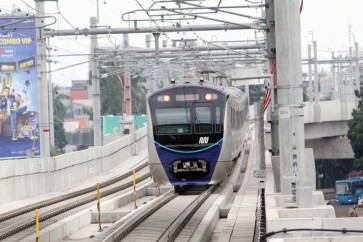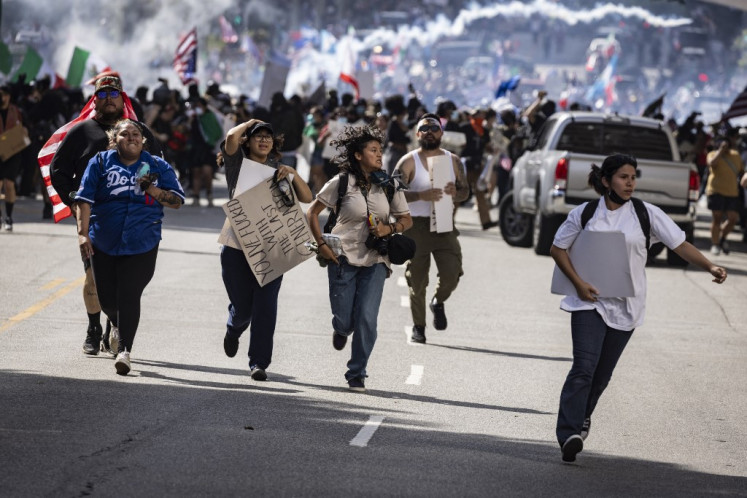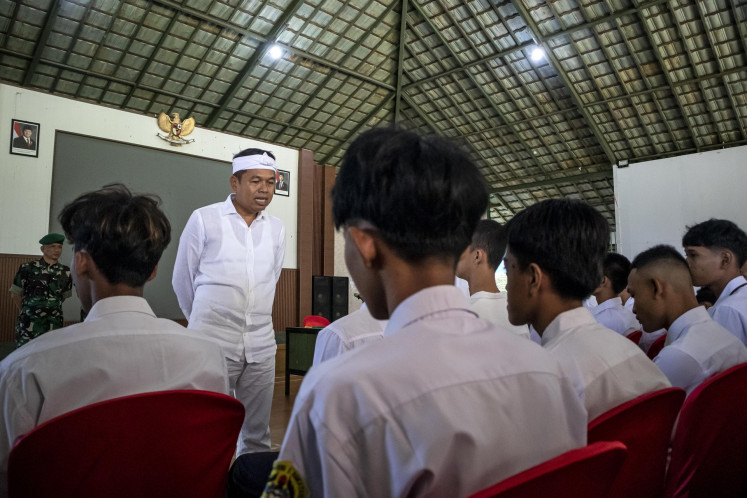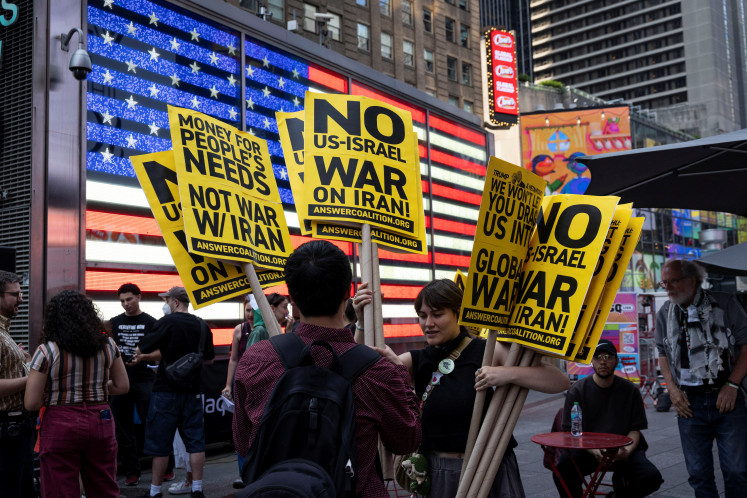Popular Reads
Top Results
Can't find what you're looking for?
View all search resultsPopular Reads
Top Results
Can't find what you're looking for?
View all search resultsJakarta's Asian Games quick fixes
Change text size
Gift Premium Articles
to Anyone
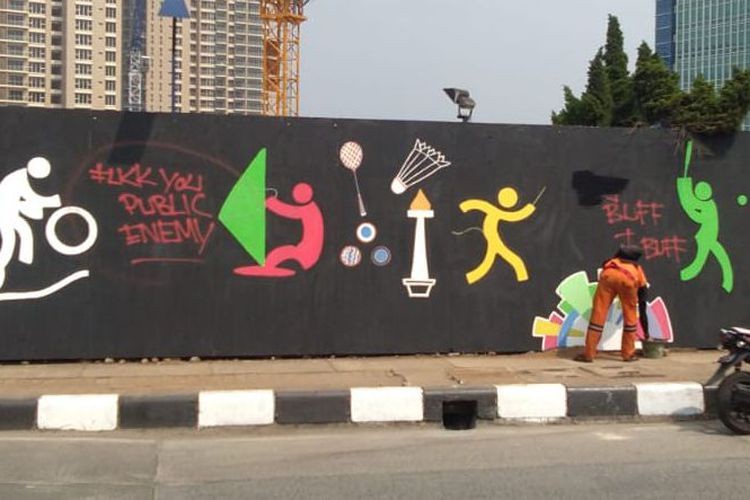 A Jakarta Public Facility Maintenance Agency (PPSU) worker covers up graffiti on an Asian Games mural at the Pondok Indah Mall intersection in South Jakarta on July 25.. (kompas.com/Nursita Sari)
A Jakarta Public Facility Maintenance Agency (PPSU) worker covers up graffiti on an Asian Games mural at the Pondok Indah Mall intersection in South Jakarta on July 25.. (kompas.com/Nursita Sari)
W
ith the 2018 Asian Games less than a month away, the Jakarta administration is putting everything at stake to make the capital presentable for foreign athletes and officials.
Jakarta Governor Anies Baswedan and Jakarta Police have issued policies that have sparked controversy to ensure Jakarta is ready to cohost the Games alongside Palembang, South Sumatra.
Here is a list of quick-fix solutions that have been offered to transform the city:
1. Covering murky river with black net
Less than 10 meters from the athletes village in Kemayoran, North Jakarta, Sentiong River, dubbed kali item (the black river), has been covered with a 689-meter-long black nylon net to prevent it from emanating its foul smell.
The fabric, worth Rp 580 million (US$ 40,002), will reportedly reduce the evaporation of the polluted water, which had resulted in the unpleasant smell. The cafeteria at the athletes village is across the river. Anies’ move to hide the river, instead of cleaning it, has been met with criticism, with memes going viral.
The city administration has also been trying to reduce the smell by using aerators and cleaning the water using nanobubble technology. “We hope the smell will not emerge from the river. We don’t intend to hide the black water. It is only one of our efforts to reduce the foul smell,” Anies said.
To make the river presentable, the industry and energy agency installed decorative lamps on the black net on Monday.
On Friday, the administration announced it would spray scented liquid on the river to reduce its smell.
Water management Agency head Teguh Hendrawan said the method had been suggested by the governor's team.
2. Declaring school holidays
Jakarta’s notorious traffic has become a major issue during preparations for the Games as the Organizing Committee of Asia (OCA) has set standards in which travel time between the athletes village in Kemayoran and the Game venues shall not exceed 34 minutes.
In hopes of alleviating traffic congestion, the administration has decided to declare a school holiday from Aug. 21 to 31 for 34 schools. Nine of those schools are located near the athletes village, while the rest are situated along the routes that will be passed by the Games delegates.
“We want to make sure there won’t be any disturbances on the routes [that will be passed by the athletes],” Anies said.
School hours might also be adjusted during the event, Anies said.
Jakarta Deputy Governor Sandiaga Uno said on Thursday that the city administration might cease activities at other schools during the event.
Parents had previously voiced their rejections over the plan, as it would disrupt school activities and year-end holiday plans.
3. Dismantling pedestrian bridge, replacing it with crosswalk
To better greet delegates of the Games near the iconic Jakarta Welcome Statue, Anies plans to dismantle a pedestrian bridge near the Hotel Indonesia (HI) traffic circle that blocks the view of the statue.
“The welcome statue was built to welcome participants of the Asian Games in 1962," he said.
Anies said he would provide two crosswalks to replace the pedestrian bridge, one at the north end of the traffic circle on Jl. MH Thamrin and one at the south end.
The crosswalks would only be temporary and would later be replaced by tunnels being built by PT MRT Jakarta for an MRT station.
“When the tunnels are finished, the crosswalks will be removed,” Anies said.
Joko Setiowarno of the Indonesian Transportation Society (MTI) criticized the policy, saying Anies failed to understand that the bridge had been constructed to facilitate pedestrians during the construction of the MRT. Joko said Anies should survey traffic conditions in the area before dismantling the pedestrian bridge.
“Implementing the policy could be dangerous for pedestrians due to the high volume of vehicles on Jl. Sudirman. A crosswalk is not recommended on the road,” Joko said.
On the other hand, the Pedestrians Coalition has lauded the plan and urged the administration to make the crosswalk permanent. Pedestrians Coalition head Alfred Sitorus said crosswalks would be safer for all pedestrians, including disabled persons, the elderly and pregnant women, than a pedestrian bridge.
Meanwhile, a bus stop on Jl. Sudirman in South Jakarta was recently the subject of memes, as 2.5 meters of median meant as a green space had separated it from a sidewalk.
Commenting on the viral meme, Sandiaga said he could not explain why the sidewalk had not been integrated with the bus stop.
“I immediately inspected the site and instructed that footpaths be built. Hopefully, buses can stop at the provided spots and commuters do not trample on the grass [on the median],” he said.
4. Expanding odd-even traffic policy
In another move to reduce traffic jams, the city administration has expanded the odd-even license plate policy on major roads across the city from 6 a.m. to 9 p.m.
The odd-even traffic policy regulates that cars with a license plate ending in an odd number are only allowed to travel in certain zones on odd-numbered dates, while those with even plate numbers are only allowed to travel on even-numbered dates.
Previously, the traffic regulation was only in effect on Jl. Sudirman-Jl. MH Thamrin during morning and afternoon rush hours. With the expansion, Jl. S. Parman in West Jakarta; Jl. DI Pandjaitan, Jl. Ahmad Yani and Jl. Perintis Kemerdekaan in East Jakarta are also affected with the policy.
In South Jakarta, the policy has been applied on the Pondok Indah arterial road, from the Kartini intersection to the Kebayoran Baru intersection, Jl. HR Rasuna Said and Jl. Gatot Subroto; while in Central Jakarta, the rule affects Jl. Benyamin Sueb in Kemayoran.
“The velocity of vehicles has increased by 12 percent since the implementation of the policy,” Anies said.
The city administration also claims the odd-even policy has reduced air pollution in some parts of the city.
5. Developing the city’s first LRT
Jakarta is developing a 5.8-kilometer light rapid transit (LRT) system to connect Games venues in Kelapa Gading, North Jakarta to the Velodrome, East Jakarta.
Even though the clock is ticking, as of Thursday, a trial run had yet to be conducted on account of construction delays.
“The LRT will operate in August as targeted,” Sandiaga said on Thursday.
City-owned construction company PT Jakarta Propertindo (Jakpro) received a mandate from the city administration to develop the LRT in October 2016. The company started developing the system in May 2017.
The project has been hampered for some time because of unpredictable rain and construction accidents, among others.
Jakpro said unexpected rainfall had delayed the construction of LRT stations as the company wanted to prioritize the safety of construction workers.
The Jakarta LRT project was also temporarily halted after the government announced on Feb. 20 a moratorium on all elevated projects in the country following a series of construction accidents.
In January, an accident occurred at a Jakarta LRT construction site when a box girder collapsed on Jl. Kayu Putih Raya, Pulogadung, East Jakarta, injuring five workers.
Another construction accident occurred in October 2017 when a portal gantry crane failed to set a box girder, causing it to fall onto a building on Jl. Kelapa Nias Raya, Pegangsaan Dua, Kelapa Gading, injuring one person.
6. Shoot-on-sight policy
Ahead of the Games, the Jakarta Police are cracking down on thieves and robbers in the capital, with police chief Insp. Gen. Idham Azis instructing officers to shoot suspected perpetrators if they resist arrest.
The force has deployed 1,000 personnel in 16 teams from all police precincts in the capital for the operation, which began on July 3 and will last until Aug. 3. As of mid-July, the police have detained 320 people and shot 52. Of the 52 suspected robbers shot, 11 died.
The operation was conducted following a series of robberies in the capital. Government officials such as Syarif Burhanuddin, the Public Works and Housing Ministry's housing director general, and President Joko "Jokowi" Widodo's expert staff member, Armedya Dewangga, were among the victims of these crimes.
On July 19, the Jakarta Legal Aid Institute (LBH Jakarta) launched a special post dedicated to gathering reports from families whose members had been affected by the policy, including those that had been the victims of extrajudicial killings.
"We received a call from the family of a detained robbery suspect who feared getting gunned down. We opened this post as an attempt to assist families in their quest for justice " Shaleh al-Ghifari, a lawyer with LBH Jakarta said.


